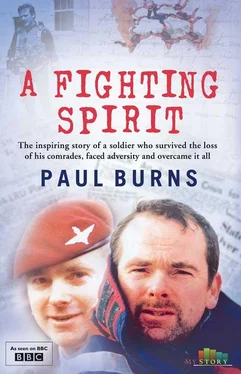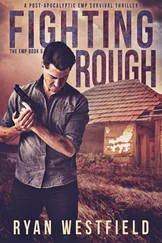What I do know is that my father’s death inevitably made life very difficult for Mum. Dad was eleven years older than her, and they’d married when she was 21. All her adult life he’d been there to look after her. Now she was on her own, with no real income and two kids to care for. She sold the house and we moved into a smaller one in another part of Nottingham. Mum took a part-time job at Rediffusion. She did the best she could, and in the circumstances she coped remarkably, but from that point on money was always tight.
As for me, I became an independent little thing and even as a small boy I remember feeling that I was the man of the house, with all the duties and responsibilities that came with it. I wasn’t the type of kid to talk about the sadness I felt, but although our family was large and close-knit, I was constantly aware of the hole in my life left by the death of my father. Some holes can never be filled, and I have always carried with me a sense of that early loss. I probably always will. And yet, even as a child, I knew there was no point complaining about these things. All you can do is play the hand you’re dealt and get on with your life as best you can. It was an early lesson, but it would prove to be one of the most important I ever learned.
I went to school at the local comprehensive. I suffer from dyslexia, but back then I doubt they even knew what dyslexia was—I think they just assumed I was a bit thick when it came to letters and numbers. I was a fairly enthusiastic student, though, despite all the extra lessons I had to take. I liked school, and I liked learning. But it was outside the walls of the classroom that my heart really lay.
At the end of our cul-de-sac in Toton there was an army training camp—Chilwell Depot, which is still used today as a mobilization centre for the Territorials before they go off to Afghanistan. Back then it was separated from the road by a simple chain-link fence. One of my earliest memories is of wandering to the end of the road and pressing my face up against the fence to catch a glimpse of the soldiers moving about inside. I was transfixed by the sight of their vehicles, and by the olive drab of their uniforms, which matched the clothes my Action Man wore. If I was lucky, I might spot one of them carrying a weapon. And, like any other boy, I was addicted to the war movies and cowboy films that were so popular at the end of the 1960s and the beginning of the 1970s. Throughout my early childhood the British Army held a fascination for me. So it was that, the very moment I was old enough to become part of the Army Cadet Force, at the age of 11, I joined up.
A bit like the Boy Scouts, the Army Cadet Force is a youth group where young lads are given a bit of structure, discipline and the chance to have quite a lot of fun. I was issued with my very own olive-drab uniform—which I always made sure was immaculate—and once a week I would attend a drill night, and occasionally we would go away on camps. The Cadet Force was tailor-made for me. Most of the adults who ran it were ex-Army, and they taught us all the things I’d been longing to know: about guns and fieldcraft; about first aid and how to use a map and compass; about signals skills and other kinds of military know-how. As a small boy, my nose pressed against the fence of the training camp in Toton, I had wondered what it might be like to be a soldier; now I was being given the opportunity to act it all out.
The Army Cadet Force was a constructive influence in my life. It was good fun and got me out of the house, of course; but it also gave me something to work for and something positive to think about. I particularly enjoyed the camps we went on. There are several of these camps dotted around the country, where a couple of hundred cadets would descend for a few days. Because all of them actively wanted to be there, and most of them tried hard to be the best at whatever they were doing, there was always a real buzz about these places. Back then, the cadet camps were made up of old wooden huts that looked like something from the Second World War. These huts contained little more than a small pot-bellied stove in the middle, with beds arranged along either side. Basic stuff, but I loved it because it gave me the opportunity to do the one thing that I enjoyed above all others, and that was being out of doors. It was thrilling to use a map and compass to move stealthily through the woods, creeping up on other people without being heard, and to build shelters what seemed like miles from civilization. I loved being close to nature, out in the wild, learning the basic fieldcraft skills that would—I imagined—allow me to survive out of doors on my own.
And, like any young boy would, I enjoyed learning how to handle a gun. We would go to proper rifle ranges, ones that real, grown-up soldiers used. It was all very exciting, even though the weapons we were given to practise on were rather old bolt-action rifles that looked like relics from the First World War. They fired reasonably large rounds, though—.303s—and for a young lad the kickback from a weapon like that was quite severe. But that didn’t matter to me. I was just thrilled to be taught how to fire a gun, just like the soldiers in the war movies. And sometimes, when we were away on camp, we were given the chance to drive tanks. Imagine it—barely a teenager and driving a tank. No wonder I loved the Army Cadet Force, and no wonder I thrived there. My boots were always highly polished, my uniform perfectly ironed and ready for inspection on drill nights. It instilled in me a lot of pride, self-discipline and self-reliance, and these are qualities that I hope have never left me. Being a cadet also bolstered my enthusiasm for all things military, and I became so obsessed with Airfix models that the ceiling of my bedroom started to resemble the Battle of Britain. And it meant that even when he was very young, the Terror of Toton had his sights firmly set on a career in the British Army.
The Parachute Regiment was born on 22 June 1940, but the British Army was late to the party in terms of military parachutists. As early as 1927 the Italians were developing a military parachuting unit; in 1936 the Soviet Army countered an Afghan invasion of Tajikistan using airborne soldiers; and, in the early stages of the Second World War, Germany had launched devastatingly successful assaults on the Netherlands and Belgium using glider and parachute troops. Hitler’s airborne units were also crucial to the Blitzkrieg that led to the fall of France in 1940 and it was this that persuaded our Prime Minister, Winston Churchill, that Britain needed its own airborne division. In a memorandum to the Joint Chiefs of Staff, he called for a ‘corps of at least five thousand parachute troops, suitably organised and equipped’ as part of his plan for ‘a vigorous, enterprising and ceaseless offensive against the whole German occupied coastline’.
Not everybody thought Churchill was right. As a report by the Air Staff put it:
We are beginning to incline to the view that dropping troops from the air by parachute is a clumsy and obsolescent method and that there are far more important possibilities in gliders. The Germans made excellent use of their parachute troops in the Low Countries by exploiting surprise, and by virtue of the fact that they had practically no opposition. But it seems to us at least possible that this may be the last time that parachute troops are used on a serious scale in major operations.
They were overruled. A Parachute Training School was set up at Ringway airfield, near Manchester, and the men of No. 2 Commando—one of fifteen Commando units that Churchill had tasked to ‘develop a reign of terror down the enemy coast’—were selected to train with parachutes.No. 2 Commando became the 11th Special Air Battalion, before mutating into the Parachute Regiment in 1942.
Читать дальше












